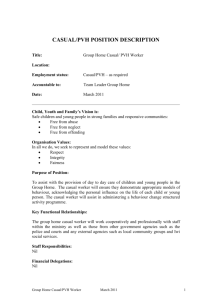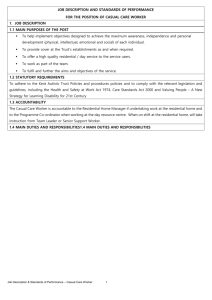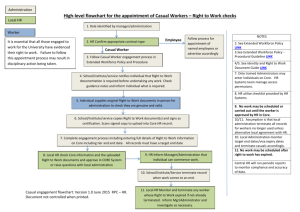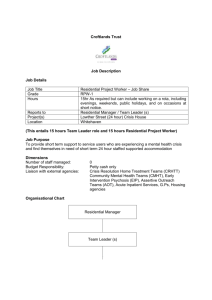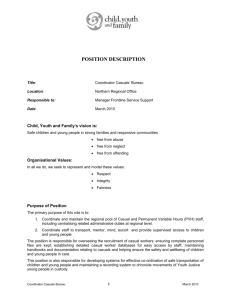Residential Casual Worker
advertisement
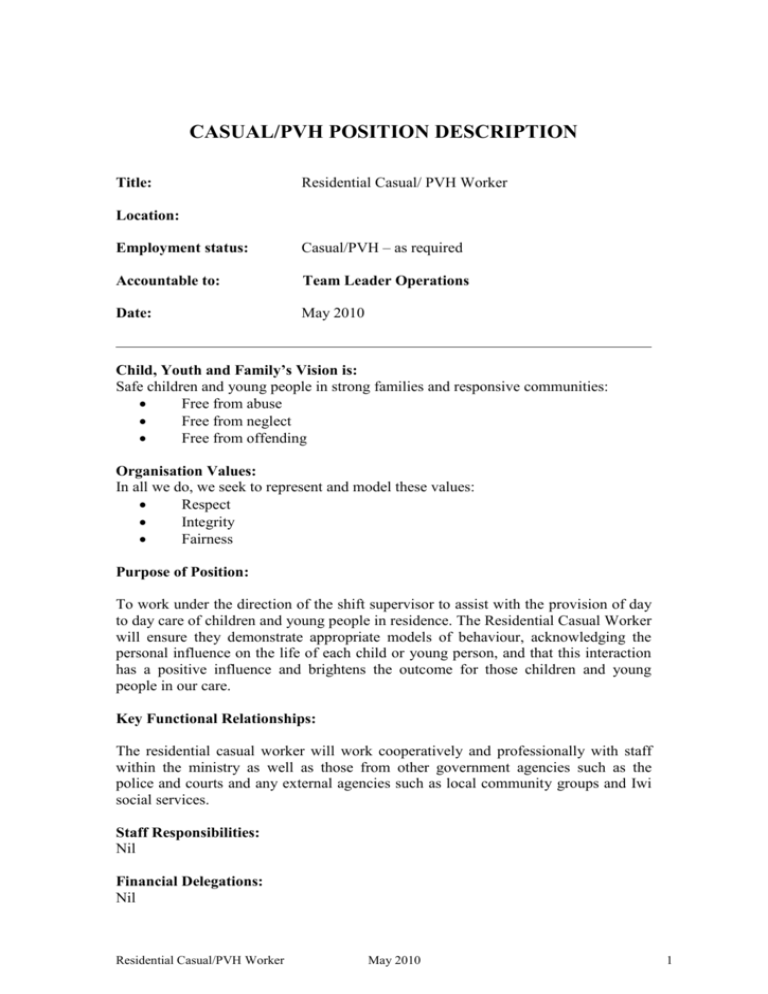
CASUAL/PVH POSITION DESCRIPTION Title: Residential Casual/ PVH Worker Location: Employment status: Casual/PVH – as required Accountable to: Team Leader Operations Date: May 2010 Child, Youth and Family’s Vision is: Safe children and young people in strong families and responsive communities: Free from abuse Free from neglect Free from offending Organisation Values: In all we do, we seek to represent and model these values: Respect Integrity Fairness Purpose of Position: To work under the direction of the shift supervisor to assist with the provision of day to day care of children and young people in residence. The Residential Casual Worker will ensure they demonstrate appropriate models of behaviour, acknowledging the personal influence on the life of each child or young person, and that this interaction has a positive influence and brightens the outcome for those children and young people in our care. Key Functional Relationships: The residential casual worker will work cooperatively and professionally with staff within the ministry as well as those from other government agencies such as the police and courts and any external agencies such as local community groups and Iwi social services. Staff Responsibilities: Nil Financial Delegations: Nil Residential Casual/PVH Worker May 2010 1 Responsibilities: Supervise children and young people To assist in delivering a professional residential care service by: : Providing effective supervision, care and custody of children and young people who are in our care in residence, by maintaining a constant presence and providing continuous monitoring.. Performing the duties required, in a professional manner, in accordance with relevant legislation, regulation, policies, codes of ethics/practice and in line with training provided. Assisting young people to develop an appreciation of their own and others culture. Carrying out all reasonable and lawful instructions given by supervisors and other duly authorised employees of Child, Youth and Family Being personally proactive, identifying, managing and mitigating risks. Residential casual workers are expected to establish, positive relationships with the child/young person They must not discuss personal matters about their own lives or make detrimental remarks about the child's parents or family or discuss other clients To operate as part of a team that meets the day to day needs of the children and young people in residence by: Performing the required tasks on shift as directed by the supervisor. Communicating clearly with other team members about individual residents and their needs Using a range of appropriate methods, as directed by the supervisor, to manage stress levels within the context of the team. Assisting in ensuring that a safe working environment is maintained for self, colleagues and residents, by following Health and Safety policies and practising safe work methods. Physical and psychological safety of children and young people Modelling the CYF values of Integrity, Fairness and Respect. Providing positive role modelling to young people. This is to be achieved through the use of appropriate language, conduct and behaviour based on respect, fairness and integrity during interactions with young people and colleagues. Residential casual workers should maintain an appropriate level of vigilance and as described in the job assignment/briefing and required on the shift responsibility, for example assisting with children and young people in school time at the residence; assisting with the delivery of recreational and cultural programme activities in the residence. Ensuring that the rights and dignity of the individual young people are upheld. Residential Casual/PVH Worker May 2010 2 Take reasonable steps to prevent: the child/young person from self harming or causing serious harm to others. the child/young person from absconding. the child/young person from damaging property. Where required to transport children and young people, the Residential Casual Worker must adhere to the transport policy and any vehicle used to transport a child/ young person (whether it is a CYF or private vehicle) must be registered, warranted and appropriately insured. Where there are problems, the Residential Casual Worker must take whatever reasonable steps to ensure the safety of the child/ young person and ensure that Child, Youth and Family is informed immediately. Familiarisation with policy and guidelines Accept responsibility for understanding and delivering the requirements of the job as outlined in the Casuals/PVH Orientation Handbook, including , for example: o Complying with Standard Operating Procedures (SOPS) for residences, as provided at residential site orientation o complying with the Health and Safety in Employment Act 1992 by taking all practicable steps to ensure own safety and wellbeing while at work and bringing safety issues to the attention of the responsible manager. o complying with requirements in respect of vehicles including, paying any traffic infringements (where the employee received a parking ticket in the course of their duties they may be eligible for payment of these where an emergency situation existed) and ensuring there is no smoking in any vehicles in which a child/ young person is being transported regardless of who owns the vehicle. o maintaining a sense of professionalism at all times as a Public Servant and as described in the Code of Conduct Administration and reporting Undertake administrative tasks as required for example completion of timesheets and attachment of job assignment sheets. Complete reports (verbally or in writing) as required by the social worker responsible for the child/ young person’s case. Ensuring, where you are required to do so, that records are maintained including the use of computer information systems. Residential Casual/PVH Worker May 2010 3 Appointee Specification Knowledge and experience The ideal appointee will have: Previous successful experience in social services work or other relevant experience. Previous successful experience in working with children and young people Youth Work or other relevant qualification. Ability to manage sensitive and confidential information in an appropriate manner and to maintain privacy of client information Ability to become familiar with working with Acts and regulations. Demonstrated understanding of Maori / Pacific Island and other cultures. Hold a current drivers licence (including the ability to drive a manual vehicle). Skills and behaviours The ideal appointee will need to demonstrate: Competence in managing and supporting children and young people. Oral and written skills. Excellent listening skills. Excellent observation skills. Behaviour management/ conflict resolution skills Calm and professional manner, with the ability to maintain performance under stress such as with distressed children or angry adults. Positive role modelling – being consistent in behaviour, generating confidence and displaying commitment to others. Ethical practice and the ability to maintain professional boundaries Residential Casual/PVH Worker May 2010 4 Competencies Competencies Descriptors 1. Client Focus The desire and willingness to understand and meet or exceed client expectations. Clients are those groups or individuals, internal or external, who use CYF’s services. 2. Communication The ability to clearly convey thoughts and ideas effectively. This may include listening, interpreting, formulating and delivering: verbal, non-verbal, written, and/or electronic messages. 3. Teamwork The ability and willingness to work with others co-operatively and productively in order to achieve group objectives. This may include informal work groups, advisory groups or committees and project teams. 4. Relationship Management The ability to interact with and develop effective working relationships with a wide range of people of different types and in different situations. This includes establishing formal and informal working relationships, developing win/win relationships and assessing and responding to individual behaviour. 5. Planning and Organisation The ability to identify objectives and develop effective action plans to achieve them. Residential Casual/PVH Worker Knows who the client is and talks about the importance of client focus. Demonstrates professional and courteous service. Is approachable, positive and responsive. Follows through on client enquiries, requests and complaints. Keeps client up to date on progress of projects or issues. Is open to client feedback. Communicates clearly, concisely, confidently, courteously, calmly and tactfully. Listens and understands. Shares information in an open and honest way. Demonstrates basic written and oral skills, including telephone skills and ability to use email. Takes clear and accurate messages. Records/inputs information accurately and collates information appropriately. Participates willingly and co-operates with others. Respects others and does one’s share of the work. Supports team decisions and is a good “team player”. Expresses positive expectations of others and genuinely values others’ input, ideas and points of view. Keeps people informed and up-to-date. Shares all relevant or useful information as required. Develops and maintains positive relationships with relevant people. Is considerate and demonstrates respect and tolerance for others. Builds good rapport with people at all levels. Actively seeks opportunities to contribute to positive outcomes for clients, stakeholders, staff and colleagues. Approaches issues or disagreements with the objective of reaching win/win solutions. Develops relationships with the intent of achieving effective delivery of relevant services. Prepares day-to-day work in advance and effectively prioritises tasks. Completes tasks in an efficient and timely manner. Follows up on tasks and monitors progress against plans and timeframes. Adopts a neat, tidy and logical approach to work. May 2010 5 Competencies Descriptors 6. Problem Solving & Judgement The ability to apply an objective, logical reasoning process to a problem or work situation in order to develop a conclusion or recommendation. This includes logically breaking down problems into different parts, identifying key issues and their relationships, interpreting, clarifying, analysing, explaining and developing recommendations or advice. 7. Cultural Responsiveness The ability and desire to show cultural sensitivity, awareness and understanding of diversity. This includes reinforcing culturally sensitive behaviour, being responsive to Maori and other cultural groups, effectively relating to clients from diverse cultural backgrounds, fostering a culturally safe working environment for staff. 8. Integrity Understands and is responsive to the needs of different cultural groups in the delivery of services; Maintains effective relationships with CYF clients and employees and understands their perspectives and priorities; Understands the practices surrounding the Treaty of Waitangi; Interacts appropriately with Maori taking into consideration tikanga and kawa. Engages effectively with family/whanau to ensure participation in decision making. Is honest, trustworthy and can be relied on for confidentiality Demonstrates professionalism at all times Sets and adheres to personal and organisational ethical standards. Demonstrates desired behaviours and treats all people with respect and dignity. Is committed to the values of Child, Youth and Family. The ability to maintain confidences and trust, and to act in an honest, ethical and professional manner. Residential Casual/PVH Worker Breaks problems down into simple lists of tasks. Understands simple linkages (e.g. A leads to B). Identifies the relevant issues. Draws on past experience to solve the current problem May 2010 6
